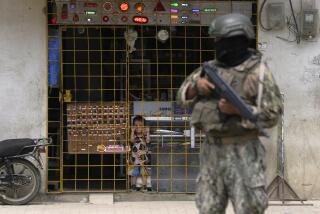Gandhi Ally Assassinated in New Delhi : He Was on Terrorists’ ‘Hit List,’ Relative Says; Wife Also Dies
- Share via
NEW DELHI — A member of the Indian Parliament who was a close political ally of Prime Minister Rajiv Gandhi was assassinated here Wednesday by two men who escaped on a motor scooter. His wife, also a politician, and another man also were killed in the morning attack.
Lalit Maken, 34, a first-term member of the Lok Sabha, the lower house of Parliament, had been warned of terrorist threats against his life two months ago by the prime minister’s office, Maken’s brother-in-law said. Meanwhile, crowds swelled outside Ram Manohar Lohia Hospital, where the popular labor leader’s body was taken.
“He was on the hit list of the terrorists,” said the brother-in-law, Deepak Rai. After the warning from the prime minister’s office, Rai said, full-time guards were posted outside Maken’s official residence.
However, there were no guards outside the family home in industrial west Delhi, where he had gone Wednesday to receive constituents and Congress-I Party workers.
After the killings, policemen were positioned at most intersections in the capital, and gatherings of more than five people were banned.
Police said they had five witnesses to the killing, which occurred as Maken was leaving his home and walking toward his car to go to the morning session of Parliament. Witnesses said that two men jumped out from behind a lightpole and fired their weapons, a 9-millimeter Sten gun and a 7.63-millimeter Mauser pistol. Sixteen shells were found at the scene.
According to the Press Trust of India, police are investigating “union rivalry, political animosity and terrorist activity” as possible motives.
Also killed in the attack were Maken’s wife, Getanjali, Congress-I political worker Balkishan Khanna. Maken’s driver was wounded. Getanjali Maken was politically active as a member of the National Students Union of India and was the daughter of the governor of Andhra Pradesh state.
Cremation rites for Maken and his wife will be held today. Gandhi was informed of the killing on the floor of Parliament, where he condemned it as part of a “cult of violence springing up all around us.” He described Maken as a “colleague, a young, promising and dynamic member of Parliament, one of our most promising members.”
Fast-Rising Young Man
A law graduate, Maken had moved up quickly in the Congress Party, both under Indira Gandhi and her son, the current prime minister. Although on the extreme left of the ruling party, he served as leader of the Youth Congress Committee and as general secretary of the Congress Party in New Delhi.
The day before his assassination, he joined opposition leaders in Parliament in protesting the government’s policy on textile exports, calling it “capitalistic.”
Educated and a fiery speaker, Maken was the prototype of the young, efficient leader that Rajiv Gandhi projected for his party when it swept last December’s elections. A former trade union chief, he replaced Charanjit Singh, a Sikh industrialist, as the Congress candidate in the south Delhi constituency from which he was elected.
There was speculation but no confirmation here that his death might be related to the Sikh conflict. Maken’s nomination by the ruling party was controversial--especially in Sikh political circles, where he had been identified as one who supposedly condoned mob rioting against Sikhs after the assassination of Indira Gandhi. In that bitter intercommunal violence, more than 1,000 Sikhs were killed in New Delhi alone.
Maken had also been an ally of Indira Gandhi’s controversial younger son, Sanjay, who died in a 1980 plane crash. His main political following, young industrial workers and unemployed slum dwellers, was the same as that of Sanjay, who had been accused by opponents of gaining his support from political mobs.
An independent study of the post-assassination riots conducted by the People’s Union for Democratic Rights and the People’s Union for Civil Liberties charged that Maken had encouraged the rioting and widespread arson against Sikh homes and businesses.
In an attempt to cool down the Sikh conflict, Rajiv Gandhi recently signed an agreement with Sikh political leaders granting them several key concessions and ordered a special judicial inquiry into the New Delhi riots. The investigating committee had its first meeting last week.
Still, no Indian official Wednesday blamed the assassination on the Sikh conflict. Witnesses to the killing said the two gunmen were clean-shaven--not turbaned and bearded, as devout Sikhs are.
More to Read
Sign up for Essential California
The most important California stories and recommendations in your inbox every morning.
You may occasionally receive promotional content from the Los Angeles Times.













